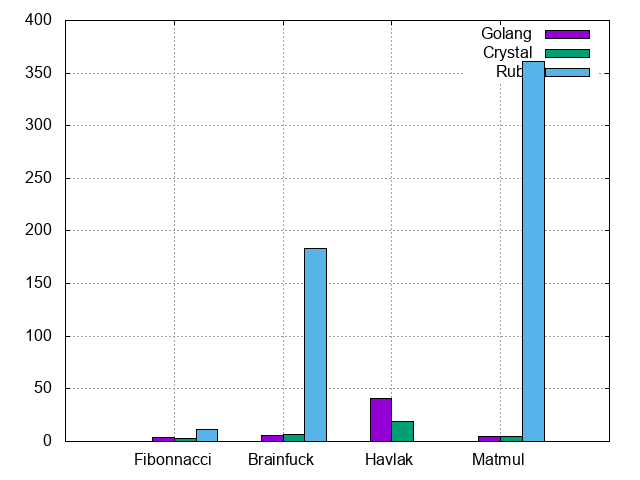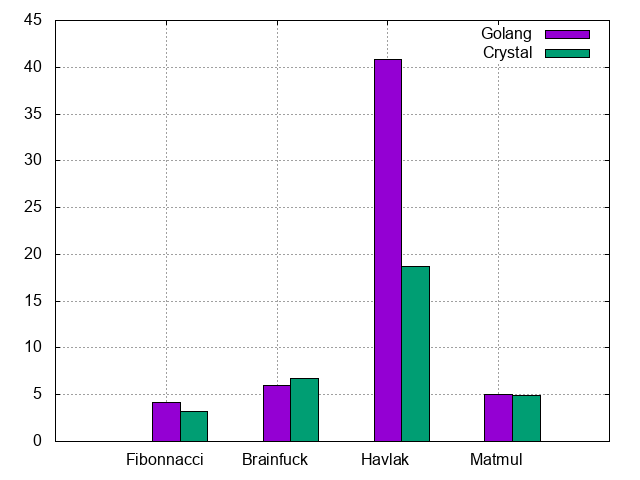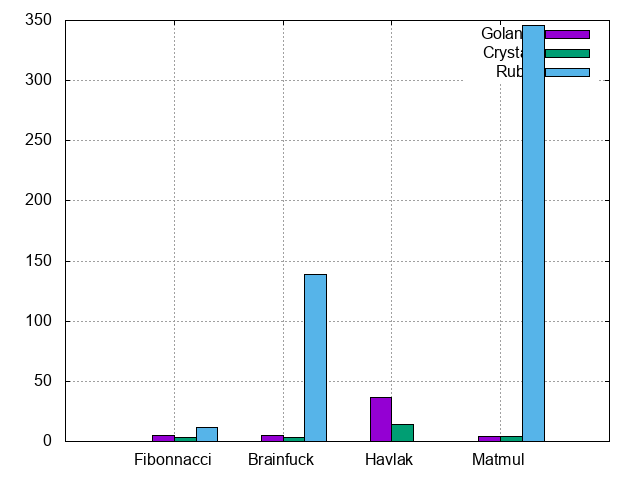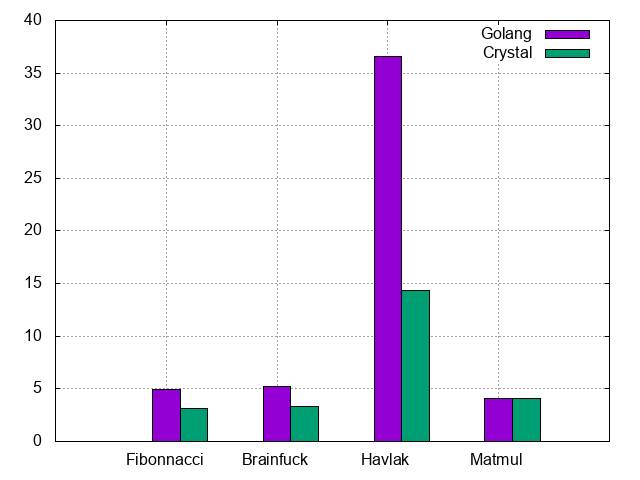Rebenchmarking Go, Crystal, and Ruby
December 14, 2016Don’t you ever tire of benchmarks? Most of those are inaccurate, hardly reproducible, and often misleading. With that out of the way, I present a benchmark of some very fine programs to compare the speeds of Go, Crystal, and Ruby. ;)
I like Ruby a lot, have used Go for some years, and I consider that Crystal is an interesting middle ground: both nice and fast, although not as mature as the two others, yet.
I recently stumbled upon Guirec Corbel’s benchmark (in French) of the three technologies, written in 2015. I though it would be interesting to check the results a year apart, but we could hardly compare our benchmarks since we’re not using the same hardware, and so I just re-benched everything.
I did some guess work to select the same versions that he probably benched in September 2015, and proceeded to rerun these on my ancient (2011) laptop. This way, we should get a more accurate idea of the evolution of our tools.
I ran these benchmarks from Archlinux, on this CPU: Intel(R) Core(TM) i7-2620M CPU @ 2.70GHz. The programs are sourced from @kostya’s benchmark repository: not all implementations are optimized, but they tend to show how a language performs when the code is more or less identical. Furthermore, I had to dig up old Crystal code to run on 2015’s version (0.7).
For each program, I simply measured the running time, taking the best of 5… If you want averages and variance, pull-requests are warmly welcomed.
Results 2015
We compare the execution time of 4 little benchmarks using:
- Go 1.5 (released 08/2015)
- Crystal 0.7.7 (released 09/2015)
- Ruby 2.2.4 (released 12/2015)
| Benchmark | Go | Crystal | Ruby |
|---|---|---|---|
| Fibonnacci (1M) | 4.16s | 3.20s | 11.34s |
| Brainfuck | 6.01s | 6.76s | 3:03s |
| Havlak | 40.87s | 18.69s | N/A |
| Matmul (1500) | 5.01s | 4.89s | 6:01s |
Now fear my mad GNUPlot skills:

OK, let’s just remove Ruby here:

Results 2016
We compare again the execution time of the same 4 benchmarks using:
- Go 1.7.4
- Crystal 0.20.1
- Ruby 2.4.0-preview3
| Benchmark | Go | Crystal | Ruby |
|---|---|---|---|
| Fibonnacci (1M) | 4.94s | 3.18s | 11.23s |
| Brainfuck | 5.18s | 3.29s | 2:19s |
| Havlak | 36.61s | 14.32s | N/A |
| Matmul (1500) | 4.13s | 4.04s | 5:46s |

Again, without Ruby:

Comparing speed gains
These numbers do not look like much, but let’s put them on a graph to compare the gains. On this graph, 100% means 2015 speed, lower means worse performance, so higher is better:

It’s easier to grasp how these platforms are all1 getting better.
These benchmarks only solicitate one CPU core, so they are a small part of a bigger story where concurrency and parallelism play a major role. Having said that, I’d really like it if Ruby’s MRI would get faster faster
I wonder if more Rubyists will switch to Crystal: clearly, the platform is just getting warmed up, and will probably get speedier with time. It is already on par with Go’s speed (even slightly faster), has not even reached a 1.0 version, and yet continually improves.
Courting Ruby developers with speed only may not work: after all, it took Rails to make the language successful.
To me, Go has gained the safer-choice award after several releases. It is a stable platform, continually improving, thanks to the backing of Google. Also… channels are <3. :)
The question we Rubyists should ask ourselves is maybe which tool should we use when our next project hits a performance limit, safe of fun?
I don’t really understand how Go has gotten worse at calculating Fibonnacci. I hope you don’t do that too much in your day to day business. :p↩︎